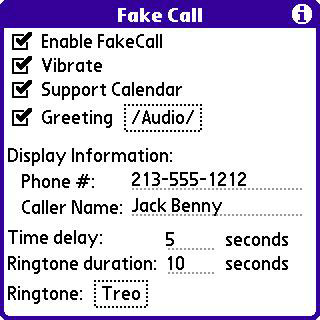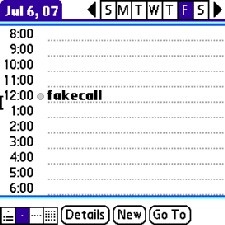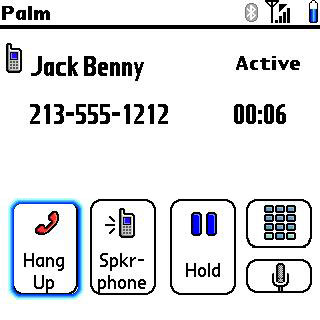Life is full of unexpected situations when it would be ideal to have an escape clause. Whether you're at a boring meeting, out on a date that's turning sour or up an unusual amount of money at your weekly poker game, there is often a good time (or an urge) to duck outta there, but no easy or graceful way to do it.
Countless movies and Old Time Radio shows (especially detective shows) have the protagonist tell his associate to call him at a certain number and time to make it appear as if there's something he has to rush off to attend to. It's a common plot device. How'd you like to be able to use that trick any time you need to without the aid of anyone else?
I know that in my life, Ive been involved in many such scenarios, including the winning in a card game situation, at which I'd like to bail "up", but dont want to offend my buddies. Surely, youve had similar circumstances, where leaving early with dignity intact is nigh impossible, but it would sure be nice if you could.

In those sticky situations, you're probably thought "hmm.. it'd sure be nice to have a personal teleporter" (or some form of divine intervention) that whisks you away at just the right moment, or a call from the President, The Pope, or your Aunt Edna that requires your immediate attention, so you can excuse yourself with poise.
Im afraid that no such beastie exists, though with your Treo and FakeCall ("FC"), a miniscule 44k app from ToySoft installed in your Treos internal RAM, you can emulate just such an arrangement.
Magic in the Boardroom.. or Boredroom..
FakeCall does exactly what its name implies: either by creating a calendar event or via a spur of the moment decision, it simulates an incoming call, using details that you specify.
A call from Donald Trump may be the ticket. Or, perhaps somebody more believable, though it could also be a slick gag to play on your pals to set up a call from some impossibly famous celeb, while youre out at the pub tossing darts. Darth Vader, Clint Eastwood, Hef, Angelina Jolie.. whoever.. its up to you. It could also be a kick to use FC to set up a call from the same person you're with!. The sheer look of confusion when you whip put your Treo, proudly displaying their name and number then begin to converse while they frantically search for their phone only to discover it isnt in use is pure delight in the making.

If you have access to somebody elses Treo, for even more devious amusement, you could use FC to set up a paradoxical call, in which their phone shows that they are calling themselves. Just slip a copy of FakeCall on their Treo when they arent looking (or even when they are, but dont seem to notice), and shove it into trial mode, then set it to work by setting a calendar event that causes it to go off at the most amusing times, with their own phone number on the screen.
Naturally, uses that are more practical probably spring to mind, and avoiding unpleasant social circumstances is something at which FakeCall excels.
If your co-workers constantly drag you into meetings, during which your presence serves no meaningful function and is therefore a big waste of your time - which you can spend more valuably taking out your aggression by torturing the same people who forced you into this mess - then getting a call from the company president during the staff meeting would be a nice exit strategy.
For one thing, such a fake call would keep those annoying folks off your back for a while as you tell them smugly I have another meeting that requires my immediate attention. Just make sure that they see your Treos screen long enough to get a glance at the caller ID, which youve set up to display the boss name and number. You devil, you.
The Cream of the Jest
FakeCall has a delightfully simply interface. Almost too simple, in fact, as it doesnt even have, or need an exit button.
Once you download and install the tiny .PRC file, you have a choice of using it in trial mode for, well, at least ten days. Im at a bit of a loss as, to quote the programs intense (10 page!) user manual For a 10 day trial tap on the 14 Day Trial button.. Therefore, you should expect to see at least 10 days of fully functional operation out of FakeCall before it forces you to bow down to the shareware gods and pay the meager $6.95 for a permanent unlock code.
The only bizarre part of registration is that, unlike most of your apps, FakeCall does not resolve its key code from your Treo's Hotsync ID, but rather from a seemingly arbitrary serial number, or Device ID.
Further investigation revealed that this mysterious series of characters is the actual serial number of your Treo, which means that if you have to replace your phone for some reason, say you accidentally drop, smash or lose it, or if you upgrade to the next model, youre going briefly to be in a spot since FakeCall is serialized to one, and only one Treo. Like the Highlander, there can be only one, so if you happen to need a new unlock code in the future, youre going to have to crawl to the developer for a new key along with a note from the teacher explaining the situation.
Why ToySoft chose to use this seemingly peculiar method of formulating a registration code is baffling, as most companies simply utilize the tried and true HotSync ID (a.k.a. the "owner name") from your Treo's Prefs, which is easily transferable when you have to migrate your data to a new device. Thats something with which Im all-too familiar, as fate recently forced me to replace one of my 700ps with a Treo 755p. When migrating my software from the old to the new phone, it was a total crap-shoot as to which software reg codes were tied to the HotSync ID, the device ID, the phone number, or (my favorite way), to nothing, but that's a rant I'll save for my "migrating (or maybe more accurately, "migraining") from a 700p to a 755p" article I'm working on.
Thankfully, FC is inexpensive and even if you have multiple Treos, slapping it on each of them wont set you back much cabbage. Add to that, if you use it to escape from situation-X at least once, youve easily justified its cost, never mind the numerous new and creative ways to use it to amuse yourself are more than worth the tiny price tag.
Running With It
A single tap unveils FC's one-screen user interface, with options to turn it on or off, allocate an audio greeting, and plug in the name and number you want to appear on your Treos phone screen when your Faked call materializes. At the same time, youll want to set up a ring duration - how long your Treo will sound the designated ringtone, which can be a MIDI, WAV or AMR (Adaptive Multi-Rate) file. Lastly, youll have to decide how long of a delay time to instruct FakeCall to wait before it sirens when you manually initialize a pseudo-call.

There are two ways to tell FC to make sound - manually, by flipping the Treo's top ring / mute rocker switch back and forth once, which you can do pretty inconspicuously while your Treo's in your pocket, or by creating a calendar event (or Agendus Meeting) with FakeCall as the event name. In the latter case, just set the time, not an alarm, as the alarm would be redundant when FC causes your Treo light up like a Christmas tree. It might also be a dead giveaway to have a system alert pop up with "FakeCall" as its description when your mock conversation initializes.
In either case, you'll be greeted by a simulated answer / ignore screen. Taping ignore simply returns you to the phone dial pad, while tapping on answer can have a variety of effects.

FC has a mimic function which lets you assign any Pocket Tunes compatible file located in the /Audio directory on your SD card to its Greeting function. If you enable this feature and assign it a valid file, when you tap the answer button, your Treo plays the file via the earpiece, thus simulating somebody yapping at you on the other end.
Keeping that in mind, you would be wise to assign something that has a human voice, male or female depending on whom you wish to impersonate. Heavy metal wouldnt be a wise selection, unless you want to simulate your mother-in-law.
There are a few minor differences between FC's mimicked call screens and the real deal, though only hardcore Treo owners are likely to notice the difference. Still, its best to play it safe and only allow them a momentary glance, and naturally, you wont want to overdo it and use FC every time something gets in your way. That would be too convenient. Better, keep it under your hat for the real social emergencies.

I suggest you give FC a few dry runs, both to test that it's set up and functioning properly, and to get the hang of using the software. Keep in mind that, while you may set up numerous phony appointments during which FC rings, it uses the exact same caller ID display for all of them until you go back in to change the name and number details. It also doesnt use your native phone book, so if you have a photo set for a contact that your Treo normally displays when they call, you wont see it on the call screen.
If the people you want to fool are sharp enough to know that your boss photo would normally be there when he calls, its best to use somebody else. Thankfully, the same situation doesnt apply to special ringtones, as you can assign the same ringer to FakeCall that you normally use for the person in question without worrying about unwanted discontinuity. There arent many Sherlock Holmes in the normal office setting, but you dont want to let your secret weapon out of the bag with a simple slip-up like that.
In any event, no record of the faked call shows up in your Call Log, nor will it generate a missed call reminder when it finishes ringing. Your Treo is still Smartphone enough to know that its not real.
The other buttons on the call screen are also just for decoration, so tapping on speaker or dial pad do nothing, which would also be a hint to an onlooker that something smelly is afoot.
Pressing the hardwired green wing button (on a Treo 700p) does nothing, whereas the red wing (or red phone on a 650) button does not end the call, but rather dims your screen, which returns to the call screen when you turn it back on again. Pressing the phone app button also behaves abnormally, so do your best to avoid these blunders and stick to FC's on-screen functions only.
I would like to see ToySoft make mods so both ALL the on-screen and hard-wired buttons completely simulate a call. You could have some real fun staging (scripting) a conversation and playing it over your speaker, IF the program would let you. Alas, no such luck as those functions are not yet in FC, thought it may be a wise use of a few minutes to contact ToySoft and mention that youd like to see them included in a future release. Developers like to hear from their
customers.
Next Page: Conclusion: The Punch Line >>